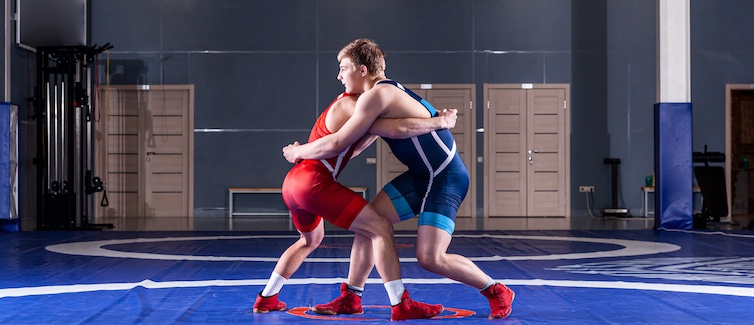In the United States, wrestling has grown in popularity in high schools and colleges. It’s estimated that more than a quarter of a million students participate in the sport. But rigorous practice and intense matches can result in both minor and serious injuries.
A recent report published by the Centers for Disease Control and Prevention (CDC) revealed that injuries resulting from men’s college wrestling actually outnumber those from football.
Never Miss a Beat!
Subscribe to Our HealthBeat Newsletter!
Thank you for subscribing!
You can now select the specific newsletters you'd like to receive.
You are already subscribed.
Subscribe to more newsletters in our email preference center.
Sorry, an error occurred. Please try again later.
Get Healthy Tips Sent to Your Phone!
What Are Common Wrestling Injuries?
Injuries happen in all sports, but injuries most common in wrestling include:
- Concussions: Concussions, or mild traumatic brain injuries, happen most often during a takedown in wrestling.
- Cauliflower ear: Otherwise known as auricular hematoma, this disfiguring injury is caused by severe bruising of the outer ear.
- Knee injuries: The knee joint is often under great strain, and wrestlers are especially susceptible to ligament sprains, meniscus tears, and prepatellar bursitis.
- Arm and shoulder injuries: Because the upper arms and shoulders are often in extreme positions during wrestling, they are prone to injury. Most common are rotator cuff strains, shoulder joint separations, partial dislocations, and elbow fractures.
- Skin infections: Because there is so much skin-to-skin contact in wrestling, infections like herpes gladiatorum, ringworm, and impetigo are common.
How to Prevent Common Wrestling Injuries
As with many sports injuries, good coaching and proper technique are essential to help prevent an injury when wrestling. In addition, wrestlers should:
- Wear headgear. Headgear and a mouthguard can help prevent head, ear, tongue, and tooth injury.
- Use padding and braces. Properly fitted knee, ankle, and elbow gear can help absorb shock and minimize injury to joints.
- Train during preseason. Cardio and strength training will ensure an athlete is in good overall shape before the wrestling season begins. Building up strength and flexibility in the quadriceps and hamstrings can help prevent knee problems and other common wrestling injuries.
- Eat and drink properly. Because wrestlers are often under pressure to meet specific weight classes, they can become dehydrated or ill from crash diets. It’s important that young athletes are supervised and learn how to manage their nutrition in a safe, healthy manner.
- Shower before and after practice and matches. Stop infections before they begin with good hygiene. Wash hands frequently, and never share personal items like towels, soap, or razors.
- Sanitize mats and other equipment after each use. Basic sanitary habits can decrease the chance of getting — and spreading — common skin infections.
How to Treat Common Wrestling Injuries
Even minor injuries, such as scrapes or small cuts, should be treated as soon as possible to reduce the chance of infection. Any wrestler showing signs of skin infection should be referred to a doctor and avoid contact with team members until medically cleared.
Minor aches and pains can usually be treated with the R.I.C.E. method (rest, ice, compression, elevation). More serious conditions (bursitis, for example) should be treated with anti-inflammatory medicines such as ibuprofen or aspirin.
Sprains, tears, and fractures should be treated by a doctor, preferably one who specializes in sports medicine.
To learn more or to make an appointment with an expert, visit UPMC Sports Medicine or call 1-855-93-SPORT (1-855-937-7678).
Sources
About Sports Medicine
An athletic lifestyle carries the potential for injury. Whether you’re an elite athlete or a weekend warrior, UPMC Sports Medicine can help. If you are looking to prevent, treat, or rehabilitate a sports injury, our multidisciplinary team of experts can help you get back into the game. If you are seeking to improve your athletic performance, we can work with you to meet your goals. We serve athletes and active people of all ages and experience levels. Our goal is to help you keep doing what you love. Visit our website to find a specialist near you.
